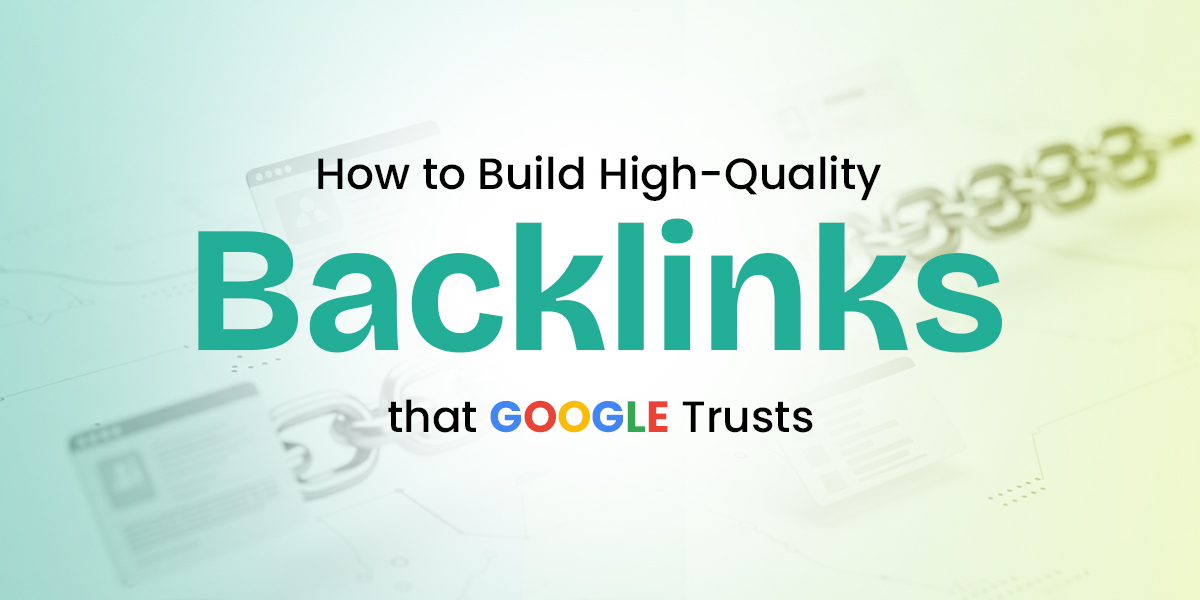
Let’s be honest — backlinks can feel confusing if you’re not an SEO Expert. However, if you want to improve your website's ranking on Google, backlinks are still a significant factor. The only catch? Google doesn’t care about how many links you have anymore — it cares about where they’re coming from and why they’re linking to you.
And trust me, as someone who’s been working as a search engine optimization specialist, I’ve seen the difference good backlinks can make. But I’ve also seen what happens when people chase links from shady sites or try to trick the system — it backfires, every single time.
That’s why this blog is here — to break things down in simple terms and help you build links the right way, using Google’s EEAT guidelines and keeping Core Web Vitals in mind.
So, what is EEAT then? It means Experience, Expertise, Authoritativeness, and Trustworthiness. Google wants to display content written by actual human beings who have knowledge of their field— and are trusted within their area of expertise.
So, when you're attempting to obtain backlinks, target websites that already have respect, consider professional blogger sites, established local directories, or sites in your niche that provide real value. If you're in digital marketing and web development, consider contacting industry blogs or even local business networks. The more reputable the site, the better that backlink appears to Google.
Before anyone links to your site, ask yourself — would you link to your site? If your site is slow, messy on mobile, or hard to navigate, most people (and Google) will pass. That’s where Core Web Vitals come in.
Your site should load fast, be easy to use on phones, and not jump around while loading. These things matter — not just for SEO, but for your visitors. If you're offering services like website development, make sure your website reflects quality. People trust what they experience, not just what you say.
Guest posting still works — but not the spammy kind. If you’re writing blogs just to drop a link and walk away, forget it. The type of guest posts that are effective in 2025 are the ones that assist actual people.
If you're an SEO expert, blog about something helpful you've acquired through your work. Pass on tips, insights, or even errors you've experienced and learned from. When people find your guest post helpful, that backlink becomes valuable — not just to Google, but to future clients too.
Want to earn backlinks without asking? Make something worth linking to. Whether it’s a helpful blog post, a tool, a checklist, or even a case study — good content travels.
Let’s say you’re in digital marketing and website development. Why not create a simple “How to Launch a Website” guide or a free template for businesses? If it’s genuinely useful, people will link to it on their blogs, social posts, or resource pages. That’s a natural backlink — and Google loves those.
Here’s a secret a lot of SEO people miss: backlinks come from real connections, not just cold emails. Engage with people in your field — follow them on social media, comment on their blog posts, share their content, and engage with them. As time goes on, these interactions can turn into shout-outs, interviews, or partnerships — all of which yield high-quality links.
If you're trying to reach people in a specific city or area, local backlinks are gold. Local newspapers, event listings, business directories, community blogs — all of these are valuable.
Think about where your ideal clients spend time online. If someone types “website development near me” into Google, local links help your site show up higher. Plus, they bring in leads that actually convert.
Once you start building backlinks, don’t set it and forget it. Look in on your backlink profile periodically. Utilize tools such as Google Search Console or Ahrefs to monitor who's linking to you. If you discover anything suspicious or off-topic, you can request removal or disavow it.
Google doesn’t just look at your links — it looks at the quality of your links. So keep things clean.
At the end of the day, the best backlinks come from real conversations, real trust, and real value. If you’re putting effort into helping people, creating content that answers questions, and building relationships — the links will come naturally.
Whether you’re just starting out or you’re already working as a search engine optimization specialist, your focus should be on trust, not shortcuts. That’s what Google rewards. And if you're offering digital marketing and website development, this is your chance to walk the talk.